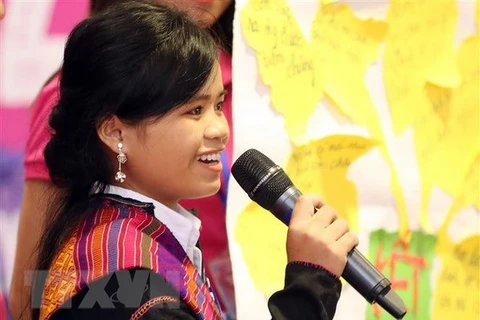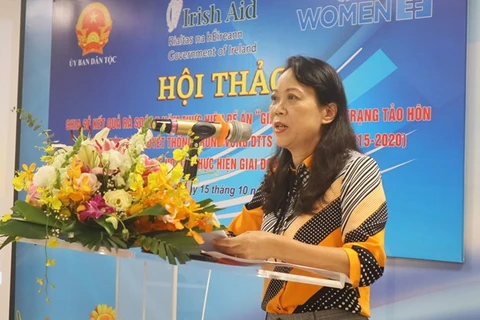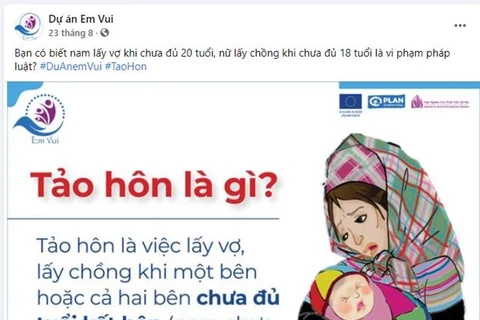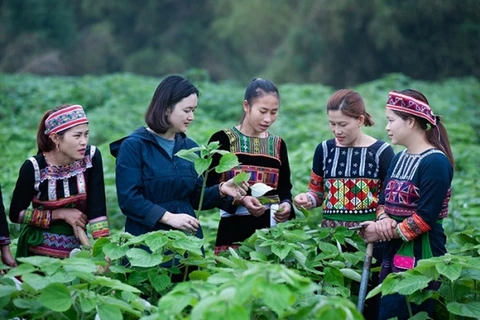Hanoi (VNA) - The United Nations Population Fund (UNFPA) in Vietnam has called upon the community to take immediate actions to end child marriage on the occasion of Valentine Day (February 14).
According to the UNFPA, to end child marriage, many changes are needed, including strengthening and enforcing laws against the practice, promoting gender equality and ensuring the community’s commitment to the rights of girls.
However, young people must also be empowered to understand and claim their rights. This means they must be provided with accurate sexual and reproductive health information, educational and skills development opportunities, as well as platforms for participation and engagement in community and civic life.
According to the Survey measuring Vietnam Sustainable Development Goal indicators on Children and Women (SDGCW) 2020-2021, co-launched by the General Statistics Office of Vietnam, the United Nations Children’s Fund (UNICEF) and the UNFPA in Vietnam, among women and men aged 20-24 surveyed, 14.6 percent of women and 1.9 percent of men were first married or in union before the age 18.
Rural women and men are much more likely to marry before age 15 and 18 than their urban peers. Marriage before age 18 among women aged 20-49 is negatively correlated with their education level and their household wealth quintile. Women who have lower education and come from poorer households are more likely to marry before their 18th birthday.
The incidence of early marriage was falling, per findings of a survey conducted by the EMPoWR project on 1,725 ethnic minority children across 17 communes of six districts in Ha Giang, Lai Chau, Quang Binh and Quang Tri in late 2020. However, only 28 percent of the respondents said they had been provided with knowledge on child marriage.
The survey indicated that 52 percent had a correct understanding of the legal minimum age for marriage. Many respondents misunderstood the age at which men are allowed to get married, while it was more common among the surveyed girls to feel the pressure of getting married to avoid becoming a “leftover” woman.
The “Enhancing awareness of ethnic minority children and young people on human trafficking and child marriage through digital technology” (EMPoWR) project is co-funded by the Delegation of the European Union and Plan International in Belgium./.
According to the UNFPA, to end child marriage, many changes are needed, including strengthening and enforcing laws against the practice, promoting gender equality and ensuring the community’s commitment to the rights of girls.
However, young people must also be empowered to understand and claim their rights. This means they must be provided with accurate sexual and reproductive health information, educational and skills development opportunities, as well as platforms for participation and engagement in community and civic life.
According to the Survey measuring Vietnam Sustainable Development Goal indicators on Children and Women (SDGCW) 2020-2021, co-launched by the General Statistics Office of Vietnam, the United Nations Children’s Fund (UNICEF) and the UNFPA in Vietnam, among women and men aged 20-24 surveyed, 14.6 percent of women and 1.9 percent of men were first married or in union before the age 18.
Rural women and men are much more likely to marry before age 15 and 18 than their urban peers. Marriage before age 18 among women aged 20-49 is negatively correlated with their education level and their household wealth quintile. Women who have lower education and come from poorer households are more likely to marry before their 18th birthday.
The incidence of early marriage was falling, per findings of a survey conducted by the EMPoWR project on 1,725 ethnic minority children across 17 communes of six districts in Ha Giang, Lai Chau, Quang Binh and Quang Tri in late 2020. However, only 28 percent of the respondents said they had been provided with knowledge on child marriage.
The survey indicated that 52 percent had a correct understanding of the legal minimum age for marriage. Many respondents misunderstood the age at which men are allowed to get married, while it was more common among the surveyed girls to feel the pressure of getting married to avoid becoming a “leftover” woman.
The “Enhancing awareness of ethnic minority children and young people on human trafficking and child marriage through digital technology” (EMPoWR) project is co-funded by the Delegation of the European Union and Plan International in Belgium./.
VNA
























